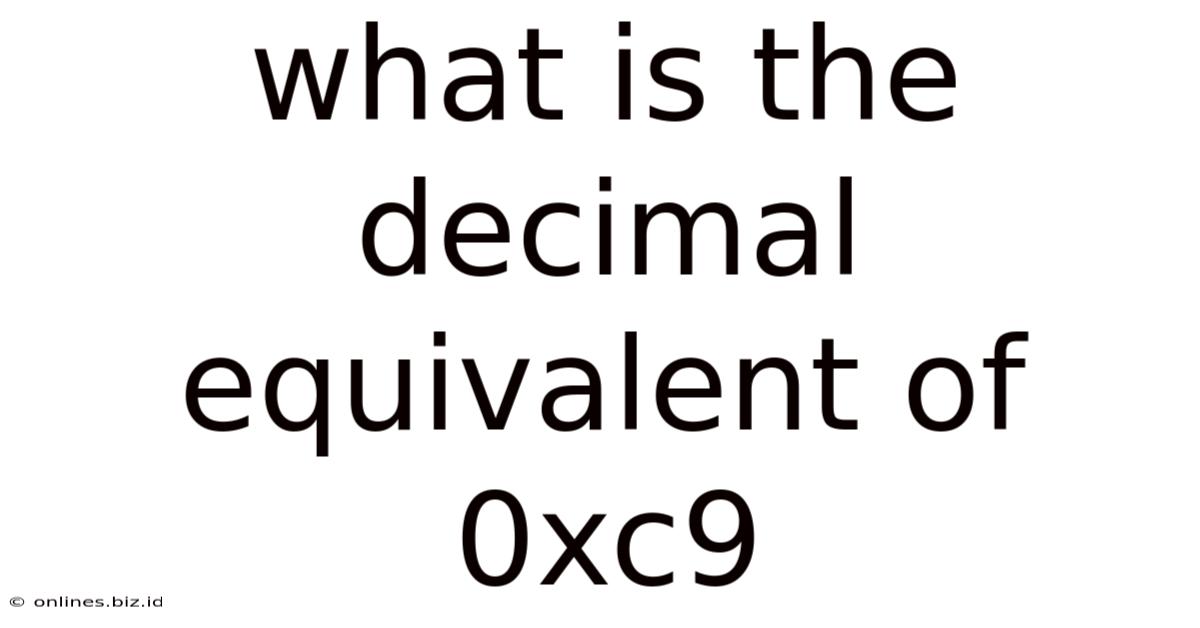What Is The Decimal Equivalent Of 0xc9
Onlines
May 07, 2025 · 4 min read

Table of Contents
What is the Decimal Equivalent of 0xc9? A Deep Dive into Hexadecimal and Decimal Conversions
The seemingly simple question, "What is the decimal equivalent of 0xc9?", opens a door to a fascinating world of number systems. Understanding hexadecimal (base-16) and its conversion to decimal (base-10) is crucial in various fields, including computer science, programming, and digital electronics. This comprehensive guide will not only answer the question directly but also explore the underlying principles and provide you with the tools to perform similar conversions independently.
Understanding Number Systems
Before diving into the conversion, let's clarify the fundamental differences between decimal and hexadecimal number systems.
Decimal (Base-10)
The decimal system, which we use daily, is a base-10 system. This means it uses ten digits (0-9) to represent numbers. Each position in a decimal number represents a power of 10. For example:
- 1234 = (1 x 10³) + (2 x 10²) + (3 x 10¹) + (4 x 10⁰) = 1000 + 200 + 30 + 4
Hexadecimal (Base-16)
Hexadecimal, or base-16, uses sixteen distinct symbols to represent numbers. Since we only have ten digits (0-9), we need six additional symbols. These are typically represented by the letters A-F, where A represents 10, B represents 11, C represents 12, D represents 13, E represents 14, and F represents 15. Each position in a hexadecimal number represents a power of 16.
For example:
- 0x1A = (1 x 16¹) + (10 x 16⁰) = 16 + 10 = 26 (in decimal)
The 0x prefix is commonly used to denote hexadecimal numbers in programming languages and other contexts to distinguish them from decimal numbers.
Converting 0xc9 to Decimal
Now, let's tackle the original question: What is the decimal equivalent of 0xc9?
The hexadecimal number 0xc9 consists of two hexadecimal digits: 'c' and '9'. We can break down the conversion as follows:
- 'c': Represents the decimal value 12.
- '9': Represents the decimal value 9.
Therefore, 0xc9 can be expressed as:
(12 x 16¹) + (9 x 16⁰) = (12 x 16) + (9 x 1) = 192 + 9 = 201
Thus, the decimal equivalent of 0xc9 is 201.
Methods for Hexadecimal to Decimal Conversion
While the manual method demonstrated above is straightforward for smaller hexadecimal numbers, larger numbers require a more systematic approach. Here are some common methods:
1. Manual Expansion Method (as shown above)
This involves individually converting each hexadecimal digit to its decimal equivalent and multiplying it by the corresponding power of 16. This method is suitable for smaller hexadecimal numbers.
2. Using Online Converters
Numerous online tools are available that can instantly convert hexadecimal numbers to their decimal equivalents. These converters are particularly helpful for larger hexadecimal values or when you need quick conversions. Simply input the hexadecimal number, and the converter will provide the decimal equivalent.
3. Programming Languages
Most programming languages offer built-in functions or libraries to perform hexadecimal-to-decimal conversions. For instance, in Python:
hex_number = "0xc9"
decimal_equivalent = int(hex_number, 16)
print(decimal_equivalent) # Output: 201
This code snippet utilizes the int() function with the base specified as 16 to achieve the conversion. Similar functions exist in other languages like Java, C++, JavaScript, and many more.
Practical Applications of Hexadecimal to Decimal Conversion
Understanding hexadecimal-to-decimal conversion is crucial in several areas:
1. Computer Programming
Hexadecimal is commonly used in programming to represent colors (e.g., #FF0000 for red), memory addresses, and other data. Converting to decimal helps programmers understand and manipulate these values.
2. Data Representation
Hexadecimal provides a compact way to represent binary data. Each hexadecimal digit corresponds to four binary digits (bits). This makes it easier to read and interpret large binary sequences.
3. Digital Electronics
Hexadecimal is frequently used in digital electronics to represent various signals and states within digital circuits.
4. Network Communication
Network addresses and protocols often utilize hexadecimal representations.
5. Data Security
Hexadecimal is used in cryptographic algorithms and hashing functions.
Beyond 0xc9: Working with Larger Hexadecimal Numbers
The principles illustrated with 0xc9 apply to larger hexadecimal numbers as well. Simply extend the method of expanding each digit by its corresponding power of 16. For example:
Let's convert 0x1A2F to decimal:
- 1: (1 x 16³) = 4096
- A: (10 x 16²) = 2560
- 2: (2 x 16¹) = 32
- F: (15 x 16⁰) = 15
Total: 4096 + 2560 + 32 + 15 = 6703
Therefore, 0x1A2F is equal to 6703 in decimal.
Conclusion: Mastering Hexadecimal to Decimal Conversions
The ability to convert between hexadecimal and decimal number systems is an invaluable skill for anyone working with computers, programming, or digital electronics. While online converters and programming functions provide convenient solutions, understanding the underlying principles empowers you to perform these conversions manually and grasp the intricacies of data representation across different number systems. This deeper understanding will significantly enhance your problem-solving capabilities in these fields. Remember the core concept: each digit in a hexadecimal number represents a power of 16, just as each digit in a decimal number represents a power of 10. With practice, you will become proficient in these crucial conversions.
Latest Posts
Latest Posts
-
What Question Is Helen Keller Answering In Her Letter
May 08, 2025
-
How Do You Demonstrate Neatness When Making A Graph
May 08, 2025
-
Which Pair Of Phrases Best Completes The Diagram
May 08, 2025
-
Shakespeare Uses This Soliloquy To Portray Juliets
May 08, 2025
-
Itn Version 7 00 Ethernet Concepts Exam
May 08, 2025
Related Post
Thank you for visiting our website which covers about What Is The Decimal Equivalent Of 0xc9 . We hope the information provided has been useful to you. Feel free to contact us if you have any questions or need further assistance. See you next time and don't miss to bookmark.